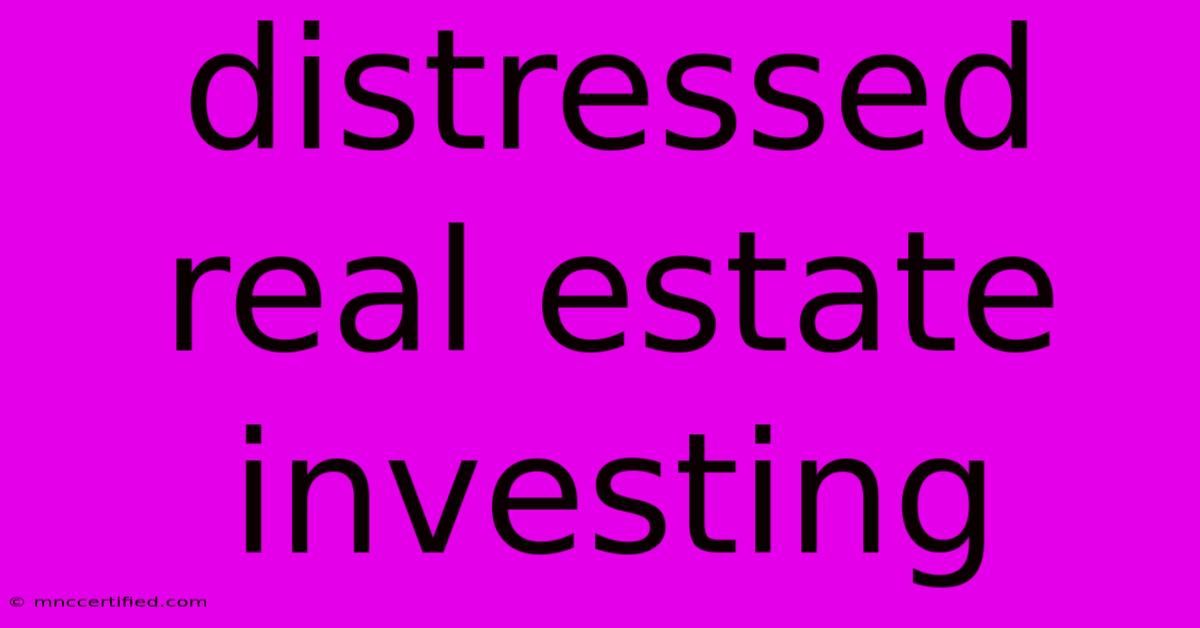Distressed Real Estate Investing

Table of Contents
Distressed Real Estate Investing: A High-Risk, High-Reward Strategy
Distressed real estate investing, the art of acquiring properties below market value due to the owner's financial hardship, presents a unique opportunity for savvy investors. While it carries significant risk, the potential rewards – high returns and significant equity gains – attract many. This comprehensive guide will delve into the intricacies of distressed property investing, exploring its advantages, disadvantages, strategies, and the crucial steps involved in successfully navigating this challenging market.
Understanding Distressed Properties
Distressed properties are typically characterized by owners facing financial difficulties, often leading to foreclosure, short sales, or tax liens. These properties often sell at a significant discount compared to their market value, creating attractive investment opportunities. However, it's crucial to understand that these properties frequently come with significant challenges.
Types of Distressed Properties:
- Foreclosure: A legal process where a lender repossesses a property due to the homeowner's default on mortgage payments.
- Short Sale: A sale where the lender agrees to accept less than the full amount owed on the mortgage.
- REO (Real Estate Owned): Properties repossessed by lenders after foreclosure and held in their inventory.
- Tax Liens: Properties with outstanding property taxes, potentially leading to a tax sale.
- Bank-Owned Properties: Properties owned directly by financial institutions.
Advantages of Distressed Real Estate Investing
- High Return on Investment (ROI): The potential for substantial profits is the primary draw. Acquiring properties below market value allows for significant price appreciation and rental income.
- Below-Market Pricing: This is the core advantage. Distressed properties offer substantial discounts, potentially leading to large capital gains.
- Forced Appreciation: By improving and renovating a distressed property, you can significantly increase its value, creating substantial equity.
- Potential for Cash Flow: Once renovated and rented, a distressed property can provide a consistent monthly income stream.
Disadvantages of Distressed Real Estate Investing
- High Risk: Distressed properties often require significant repairs and renovations, incurring unforeseen costs. Legal complexities and title issues are common.
- Time-Consuming Process: Finding, evaluating, and acquiring distressed properties can be a lengthy and laborious process. Negotiating with multiple parties (lenders, owners, etc.) is often required.
- Hidden Problems: Distressed properties may harbor hidden structural damage, code violations, or environmental hazards, significantly impacting renovation costs.
- Market Volatility: The distressed real estate market is sensitive to economic fluctuations and interest rate changes.
Strategies for Distressed Real Estate Investing
- Networking: Building relationships with real estate agents, wholesalers, and foreclosure attorneys is crucial for accessing distressed property listings.
- Property Analysis: Thorough due diligence is paramount. Conduct a comprehensive property inspection, review title reports, and assess potential repair costs.
- Negotiation Skills: Distressed property acquisition often involves sharp negotiation with motivated sellers or lenders.
- Financing: Securing financing for distressed properties can be challenging. Explore private lenders, hard money loans, or creative financing options.
- Rehabilitation Expertise: Understanding renovation costs and timelines is essential for successful property rehabilitation.
Steps to Investing in Distressed Properties
- Market Research: Identify areas with high concentrations of distressed properties.
- Financial Planning: Secure funding and create a realistic budget.
- Property Search: Use online resources, network with professionals, and attend foreclosure auctions.
- Due Diligence: Conduct thorough inspections and research the property's history.
- Negotiation: Make an offer and negotiate a favorable price.
- Closing: Complete the purchase and secure financing.
- Rehabilitation: Renovate and improve the property.
- Rental/Resale: Rent the property or resell it for a profit.
Keyword Optimization and Off-Page SEO
This article incorporates several keywords related to distressed real estate investing, such as:
- Distressed real estate investing
- Foreclosure investing
- Short sale investing
- REO investing
- Tax lien investing
- High-risk, high-reward investing
- Real estate investment strategies
- Distressed property analysis
- Property rehabilitation
- Real estate due diligence
Off-page SEO: To improve rankings, promote this article through social media, guest blogging on relevant real estate websites, and building high-quality backlinks from authoritative sources.
Disclaimer: This article provides general information and should not be considered professional financial or legal advice. Consult with qualified professionals before making any investment decisions.

Thank you for visiting our website wich cover about Distressed Real Estate Investing. We hope the information provided has been useful to you. Feel free to contact us if you have any questions or need further assistance. See you next time and dont miss to bookmark.
Featured Posts
-
Womens Cl Arsenal Juventus Hammarby Man City
Nov 22, 2024
-
Why Rooney Wont Watch Coleens Show
Nov 22, 2024
-
Juventus Women At Arsenal Uwcl Preview
Nov 22, 2024
-
Wayne Rooney Scandals Coleens Reveal
Nov 22, 2024
-
Dansons A Man Inside Review
Nov 22, 2024